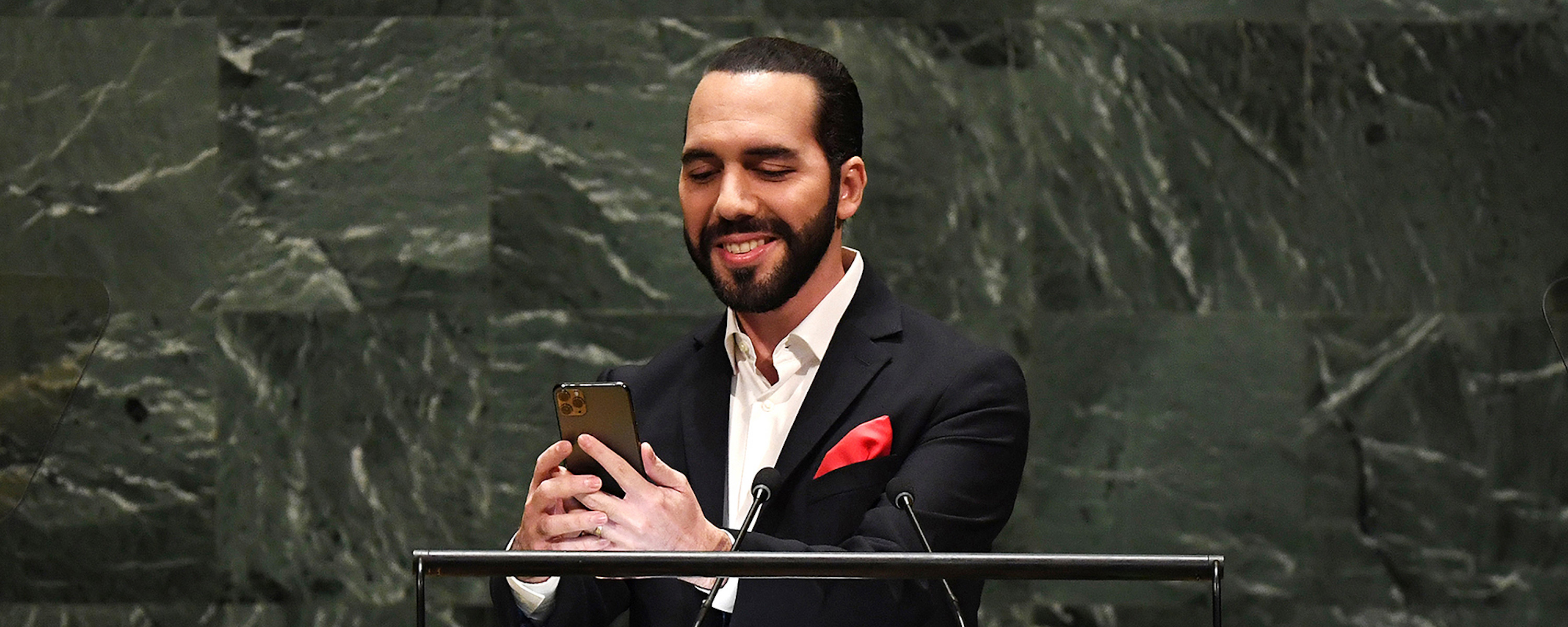As Salvadoran President Nayib Bukele prepares to address the 77th U.N. General Assembly today, his media image as the “cool” millennial president has frayed since he took a selfie from the stage in 2019. He will speak at 7 p.m. EDT, between the Central African Republic and Japan. Honduras and Guatemala will take their turns earlier in the afternoon.
If his Independence Day speech last week is any guide, he’ll likely focus his remarks on his promise to “re-found the republic” and non-intervention, understood as the international community keeping silent about corruption, human rights abuses, harassment of civil society and journalists, and cooptation of state institutions under his administration.
In the past five days since he announced that he will illegally seek reelection in 2024, he has enjoyed that quiet complicity. Even Honduras, which regularly cites the unconstitutional reelection of Juan Orlando Hernández in 2017 as evidence that the preceding head of state was a dictator, will not apply that logic to Bukele.
“We have no response,” Dassaev Aguilar, a spokesperson for the administration of Xiomara Castro, told El Faro English. “Those are the internal affairs of El Salvador.” The governments of Guatemala, Costa Rica, and Nicaragua (where Ortega was reelected to his fourth consecutive term in November) didn’t return requests for comment.
As discussed in our July 1 and August 26 newsletters, silence on human rights abuses and authoritarianism has become a ground rule in Central America. In recent months El Salvador, Honduras, and Guatemala have repeatedly stressed respect for “sovereignty.” In mid-August talks about creating a Central American Union, Nicaragua asked to “set aside our differences.” And Costa Rica, despite the protests of a score of ex-presidents, signed off on Managua’s bid to take the reins of SICA.
“Poor #CentralAmerica! Condemned to retrace its own steps, forever tied to the plans of unscrupulous rulers fueled by their obsession with absolute power,” tweeted former Costa Rican president Laura Chinchilla on Thursday, on the heels of Bukele’s announcement. “#ElSalvador joins #Nicaragua.”
“Both sides”
When asked by El Faro English, the U.S. watered down its previous position on the legality of consecutive reelection in El Salvador.
One year ago, right after Bukele loyalists in the Constitutional Chamber set aside the constitutional ban in giving the president the O.K. to run for reelection, interim U.S. ambassador Jean Manes compared him to Hugo Chávez.
Manes called the ruling a “clear violation of the Salvadoran Constitution,” and the “direct result” of the illegal removal of the high court’s previous magistrates on May 1, 2021. She condemned it as 'a clear strategy' on the part of the president 'to undermine judicial independence and eliminate a key counterweight to executive power.'
The Biden administration seems to have now lowered its tone.
“As leaders struggle to govern, there’s this instinct to change the rules of the game to stay in power,” said Biden national security advisor Juan González on Monday at an event hosted by the U.S. Institute for Peace, only to immediately hedge his criticism: “I’m not an expert on the Salvadoran constitution. There have been arguments on either side that, ‘This is legal,’ or, ‘This is not legal.’”
“The justification that popularity justifies the means is really the same argument that Hugo Chávez made in the late 90’s,” he added, before softening again: “Notwithstanding the disagreements we may have with the Salvadoran government, we need to be present and engage with the government, the people, and the private sector on these sorts of issues.”
The State Department was even more cautious. El Faro English asked on Friday for an official stance on Nayib Bukele’s announcement and was told twice that officials were 'working on an official response” that would be ready on Saturday.
On Monday, a spokesperson responded: “The United States respects free and fair elections and the sovereign right of Salvadorans to determine their own future through the democratic process, consistent with the Salvadoran constitution.” They added that El Salvador’s success “can be best assured by firm adherence to the rule of law, including the constitution.“ No reference to Bukele or his reelection.
2024 Opposition front?
Virginia Democrat Tim Kaine, of the Senate Foreign Relations Committee, took a much tougher stance: “Salvadoran President Bukele replaced El Salvador’s Supreme Court with his allies, and now he wants to seek re-election in violation of the country’s constitution,” he tweeted. “I’m deeply concerned by what these steps could mean for rule of law and democracy in El Salvador.”
California House Democrat Norma Torres, the chair of the Central America Caucus whose sparring with Bukele early last year goaded the Salvadoran president into calling on her constituents to vote her out of office, wrote, “I wonder where he learned to ignore the constitution?” She added: “We must do better to support those people who are fighting for democracy and accountability.”
Within Salvadoran borders, where support for reelection has found an easy majority according to government propaganda, critical voices are sounding the alarm.
On Friday the Central American University Human Rights Institute (IDHUCA) published a strongly-worded editorial entitled, “It’s official, the president is fastening himself in power.” The National Association of Private Enterprise (ANEP) issued a statement underscoring six articles of the constitution that prohibit immediate reelection.
The Block of Popular Resistance and Rebellion, one of the organizations that convened anti-government protests on September 15, called for a “Frente Amplio” (“broad front”) of “leftist, democratic, and progressive forces to struggle against the dictatorial regime.”
Last night El Faro published an interview with center-right opposition legislator Claudia Ortiz, from the party Vamos (no relation to that of Guatemalan President Alejandro Giammattei), in which she claims that there is already a plan in the works to create an opposition alliance of political parties of “different stripes” and social movements to compete in the 2024 elections.

